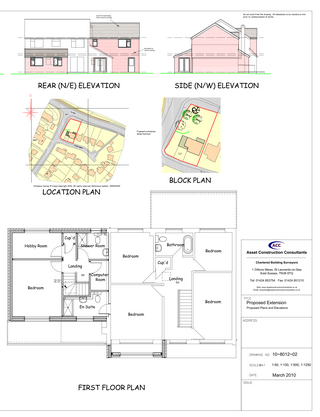Legal Consultancy
Statutory Approvals
Town and Country Planning
Asset Construction Consultants can prepare planning drawings for all types of buildings including residential, commercial and industrial and for all types of development including new build, extensions, refurbishments and conversions. Some domestic extensions and alterations do not require planning permission and can be built under Permitted Development rights (see Legal section). Asset Construction Consultants can give you further advice in this respect and you can be sure that an application will only be submitted when necessary.
Once the drawings are prepared we can prepare and lodge the planning application on your behalf should this be necessary. Our service continues throughout the application period and we liaise fully with the Local Authority as necessary and if necessary meet with the planning officers either on site or at another location to suit them. These applications can include outline, full, change of use etc. Asset Construction Consultants have experience with all these application types and can advise fully on the way to proceed for your particular circumstances.
A brief description of each application type is described below:

Outline
Outline applications are useful for establishing whether or not your development or building project is likely to be accepted in principle, without the expense of making a full detailed application. They are particularly useful for contentious projects or where it is unclear whether full detailed approval will be obtained.
Detailed plans are not usually submitted at this stage, although the Council may ask for more details. For example details such as design, materials to be used and landscaping are not normally submitted with the outline application. Outline simply deals with ideas and the basic principles of development such as overall size, density, car parking etc.
Outline permission is valid for three years, but the period extends for up to five years if reserved matters are applied for. Reserved matters applications are put forward after outline-planning consent has been obtained and must be applied for within three years of the outline consent being granted.
Approval of Reserved Matters
Approval of Reserved Matters is required following the granting of an outline application. A reserved matters application sets out outstanding details of the proposal including access arrangements, siting, design and landscaping, while taking into account any conditions that have been given in the original outline consent.
Full
Full planning applications usually include domestic applications and is the most common type Asset Construction Consultants apply for.
These applications include full design details including plans and elevations and other details including siting and access arrangements.
Planning permission will usually last for five years from the decision date.

Change of Use
Asset Construction Consultants specialise in the preparation of planning applications for the change of use of buildings and land. Many changes of use require planning permission, including conversion of a large single family house into self contained flats and change of use from Class A1 (retail) to Class A3 (food & drink), and to Class A2 (financial & professional services).
Please feel free to contact us regarding any of the above and to obtain a competitive fee quote for your particular circumstances.
Example Downloads –
Listed Buildings and Conservation Areas
Asset Construction Consultants can provide full advice on the requirements for Listed Building and Conservation Area consent and submit the applications and liaise fully with the Local Authority on your behalf and meet the Planning and Conservation Officers either on site or at another location to suit them.
Any works to a Listed Building in any way that affects its character (including some internal alterations) require Listed Building Consent for the works from the Local Authority. It is important to note that Listed Building Consent is required in addition to planning permission, although these applications do not attract an additional fee payable to the Local Authority.
Please feel free to contact us regarding any of the above and to obtain a competitive fee quote for your particular circumstances.
Planning Appeals
Should the worst happen and a planning application is refused you have a right of appeal against all refusals and against enforcement action taken by Local Authorities.
Asset Construction Consultants can offer advice and help with regard to planning appeals. We can handle the whole process on your behalf, including preparing the case. This includes a statement as to why we consider that planning permission should have been granted. This is then submitted to the Planning Inspectorate in Bristol (for applications submitted in England).
The appeal and essential supporting documents must reach the Planning Inspectorate:-
- Within 6 months of the date shown on the local planning authority’s (LPA) decision notice; or
- For non-determination (‘failure’) appeals, within 6 months of the date by which the LPA should have decided the application.
The process generally involves sending in all the information to support the appeal. An inspector is appointed to read through all the submissions, to visit the site and then decide whether the Local Authority should have approved the application. The decision is a long process and often takes about six months. Appeals to do with listed buildings or buildings in a conservation area are very similar to normal planning appeals, but there are slight differences.
Please feel free to contact us regarding any of the above and to obtain a competitive fee quote for your particular circumstance.

Building Regulation
Nearly all building work including extensions and alterations require Building Regulation approval. These applications are submitted to the Building Control department of the relevant Local Authority or approved inspector. The purpose of Building Control is to enable businesses, home owners, designers and builders to comply with the statutory Building Regulations. Building Regulations exist to ensure the health and safety of people in and around all types of buildings (i.e. domestic, commercial and industrial). They also provide for energy conservation, and for access and facilities for disabled people.
Asset Construction Consultants specialise in the preparation of detailed drawings for all building works including new build, extensions, refurbishments and conversions. Our experience with preparing these detailed drawings allows us to design the structure with the correct selection and efficient use of building materials and techniques. This would generally lead to the most cost efficient design and construction thus minimising the cost of the extension.
Once these drawings are prepared Asset Construction Consultants prepare and submit the application to the relevant Local Authority. We then liaise with the officer dealing with the application until approval is obtained. In many cases once this approval has been obtained, the drawings we have prepared can be used to obtain competitive quotations from building Contractors.
For some buildings, for example new dwellings, part of the Building regulations requires an energy assessment (SAP or Carbon Index rating) to be calculated. We can provide this, but this works is normally carried out by an external consultant.
Please feel free to contact us regarding any of the above and to obtain a competitive fee quote for your particular circumstances.
Party Wall Etc Act 1996
The Party Wall etc Act 1996 now applies to the whole of England & Wales. It confers rights and duties on a contractor when carrying out certain works that affect adjoining property.
The Act covers the following works:
- New Building works at or astride the boundary between two properties.
- Structural work affecting an existing shared/party wall, including repairs, alterations, extending or reducing the wall, cutting into the wall and underpinning.
- Excavating, or constructing foundations within three metres of a neighbour’s building where the new foundations will go deeper than the neighbour’s foundations.
- • Excavating, or constructing foundations within six metres of a neighbour’s building where the new foundations will cut a line drawn downwards at 45 degrees from the bottom of the neighbour’s foundations.
The Act refers to the person carrying out the work as the Building Owner and any other interested parties as adjoining owners. You are considered an interested owner if you are a freeholder or a leaseholder with an unexpired interest of more than a year.
The Act allows Contractors to proceed with the works, but they must first notify adjoining owners giving the necessary notice in the prescribed format. Often an Party Wall Award needs to be in place prior to starting the works. An Award is a document that highlights matters of concern and gives statements as to how and when the work should be carried out.
In the event of there being any disagreement, the Act provides a mechanism of dispute resolution through the appointment of surveyors. It also imposes a statutory duty on developers to avoid unnecessary inconvenience and compensate for any loss or damage.
Asset Construction Consultants have experience in acting for both the Building Owner and Adjoining Owner. The scope of our service would include advising on the rights imposed and obligations conveyed by the Act.
If you are the Building Owner we would identify elements of the proposed works which fall within the Act. We prepare and serve all notices, prepare and agree schedules of condition and Awards and resolve issues of damage or compensation.
If you are the Adjoining Owner we will advise on validity of Notices received, examine details of proposed works to ensure that proposals are appropriate and will avoid causing unnecessary inconvenience or damage. We will again check and agree schedules of condition and negotiate the terms of Awards and finally ensure that the Building Owner fulfils his statutory obligations.
Please feel free to contact us regarding any of the above and to obtain a competitive fee quote for your particular circumstances.
Construction (Design and Management) Regulations 2015 (CDM Regulations)
Virtually everyone involved in a construction project has legal duties under CDM 2015. Asset Construction Consultants are frequently designers under these regulations. Designers are those who, as part of their work, prepare design drawings, specifications, bills of quantities and the specification of articles and substances. As well as including us this includes other consultants including structural engineers. The new regulations have a new role, Principal Designer. The Principal Designer is appointed by the client to control the pre-construction phase on projects with more than one contractor. The Principal Designer’s main duty is to plan, manage, monitor and coordinate health and safety during this phase, when most design work is carried out and to take the lead in planning, managing, monitoring and coordinating health and safety during the pre-construction phase of a project involving, or likely to involve, more than one contractor. Asset Construction Consultants carry out full Designer duties under this legislation and can carry out the Principal Designers duties or work closely with the appointed Principal Designer.
Boundary Disputes
Asset Construction Consultants are experienced in handling boundary disputes. Many disputes occur in relation to front and back gardens of residential homes. We are experienced in determining and establishing locations of boundaries between two owners in dispute. Land Registry Title Plans and Ordnance Survey maps offer little assistance in locating the legal boundary of the property. They do sometimes have some information which can assist in locating the general or physical boundary of a property. This can be the same as the legal boundary but is not always the case.
If we are asked to provide advice on boundaries, we would request and study old building plans, deeds and historic indications on the ground in order to determine the most likely location of a legal boundary.
When Asset Construction Consultants are instructed to deal with boundary disputes, it is our intention to reach agreement with the other Party, or with his or her Surveyor, without the needing to go to Courts. Court should always be the last resort.
We are able to provide advice from an early stage and provide a complete service. This can include:
- Including establishing the general boundaries
- Providing and locating pegs in the ground to physically mark the boundary
- Arranging for a fencing Contractor to erect a fence or other demarcation
- Arepare full CAD drawings showing the current and correct position of the boundary with measurement as necessary.
We are also able to liaise with your legal advisors to ensure that any changes made are properly recorded and attached to the deeds of the property.
Asset Construction Consultants can also negotiate access agreements, including scaffold licenses and crane oversailing licenses.
Asset Construction Consultants also offer advice on the provisions and practical implications of the Access to Neighbouring Land Act 1992.
Please feel free to contact us regarding any of the above and to obtain a competitive fee quote for your particular circumstances.

Expert Witness
Matthew Goddard has experience in the inspection and preparation of expert witness reports for residential and commercial properties. He accepts appointments as expert witnesses in these fields where cases are before the Courts, Tribunals and Arbitrators.
He has previously been appointed as an expert witness by one of the parties or as a joint expert witness appointed by both parties.
The expert witness report is intended to assist the Court in matters of which the witness has expertise. They must comply with the Civil Procedure Rules. The report must be the independent and unbiased product of the surveyor and fall within his expertise, experience and knowledge.
The report must state the facts and assumptions that it is based upon, and include all items which are relevant to the expert’s conclusions. It must be impartial and uninfluenced by those instructing or paying the surveyor to give the evidence.
A well drafted, unbiased expert witness report often helps the parties to reach agreement and settle a dispute without the need for a court or tribunal hearing.
Prior to accepting an appointment as an expert witness, the fees are agreed which will include time to inspect the property, peruse documents, carry out research and prepare the report. This would normally be a rate per hour of time expended but can be a fixed fee for the initial report although this is difficult to provide as the amount of time required is difficult to assess in advance.
Following submission of the expert witness report, should further information, attendance at meetings or Court hearings be necessary then further fees will be chargeable at the agreed rate.
Equality Act 2010
The Equality Act 2010 is aimed at ending discrimination against disabled people. Discrimination occurs when a disabled person is treated less favourably than someone else because of their disability or when there is a failure to comply with the duty to make ‘reasonable adjustments’ and this failure is not justified. The Act, for which there are several parts, makes it unlawful for an Employer or Service Provider, to discriminate against any disabled person.
One of the major sections is Part III, which covers Access to Goods, Facilities and Services and requires reasonable adjustments to be anticipated for the disabled population at large and any alterations implemented. This part of the act is concerned with organisations which offer services and facilities to the general public. Part III of the Act has been introduced in stages and most of the provisions are already in place.
Since December 1996 it has been unlawful to refuse your services and since October 1999 it has been necessary to review policies, procedure and practices, providing auxiliary aids or demonstrating alternative ways to provide the service. From October 2008 the Act extends this requirement to include making reasonable physical adjustments to buildings. Reasonable adjustments may be removal, alteration or providing means of avoidance of a feature, or providing an alternative service.
If you supply goods, services or facilities to the public, whether paid for or for free you have duties under this section of the Equality Act 2010. You could be liable for court judgments against you for failure to meet your obligations under the Act. The Equality Act 2010 applies to tenants as well as building owners.
An access audit An Access Audit of buildings is a useful starting point in assessing the current state of accessibility and usability of buildings by disabled people. It is an inspection of the current provisions and it identifies shortfalls and suggests remedial actions. Asset Construction Consultants are experienced in the preparation of these reports and can assist you with meeting your obligations under the Disability Discrimination Act.
A full audit report will highlight areas where we feel the Service Provider is not meeting their obligations under the DDA. These items include comments, recommendations, a priority rating and cost assessment.
The requirements of the Act are very much broader than just having ramped access.
Reasonable adjustments may include alterations or improvements to car parking and external approaches, entrance and reception areas, circulation routes around the building, signage and directions, colours and contrasts, other facilities to aid the disabled such as accessible toilets, induction loops etc, and management and staff training and awareness.
Please contact us for more information on Access Audits and to obtain a competitive fee quote for your particular circumstances.
